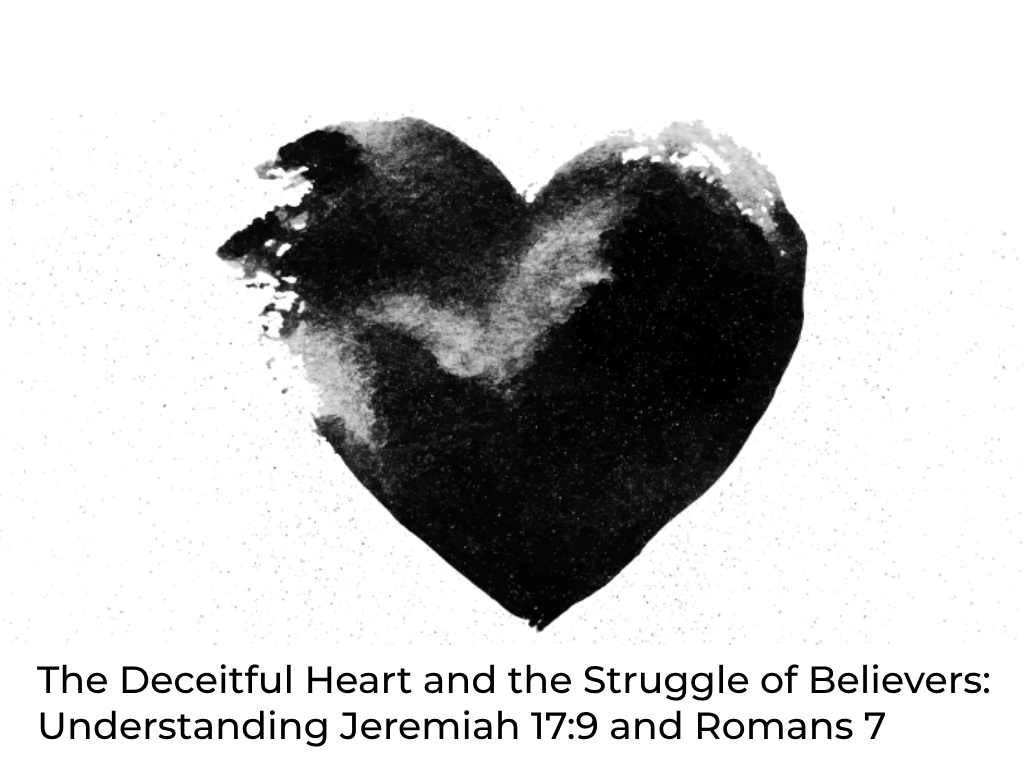
In the Bible, there are passages that describe the fallen nature of humanity and the struggles faced by believers. Two such passages are Jeremiah 17:9, which speaks of the deceitful nature of the human heart, and Romans chapter 7, where the Apostle Paul reflects on the ongoing battle between the spirit and the flesh. In this blog article, we will explore these passages and their implications for both believers and non-believers.
The Deceitful Heart of Humanity
Jeremiah 17:9 presents a clear commentary on the fallen state of humanity, stating, “The heart is deceitful above all things.” This verse highlights the pervasive nature of deceit within the hearts of individuals. It reveals that the unregenerate heart is prone to deception, constantly leading people astray. Furthermore, it emphasizes that apart from God, the heart is only evil continually.
Romans 3:10-20 further illuminates the fallen state of humanity. It emphasizes that the unregenerate heart does not seek God, His glory, or truth. The unregenerate heart lies to its owner, leaving individuals blind and dead to the truth. Jeremiah 17:9, in conjunction with other passages like Romans 3, paints a clear picture of the fallen condition of humanity.
The Struggle of the Believer
While Jeremiah 17:9 addresses fallen humanity in general, Romans 7 presents a different perspective. In this chapter, the Apostle Paul candidly describes his own struggle with sin, using phrases such as “wretched man that I am.” It is important to note that Paul, in this context, is referring to himself as a believer in the New Covenant.
Paul’s expression of struggle in Romans 7 should not be misconstrued as an indication that believers are excluded from the transformation of the heart. In Romans 6, Paul establishes the transformation that takes place in a believer who has become a slave of righteousness through the redemptive work of Christ.
Paul declares his love for God’s law, acknowledging its holiness, justice, and goodness. These sentiments reflect the heart of a believer who has been transformed by the power of the Holy Spirit. Unlike the unregenerate heart, the believer’s heart is no longer deceived. It recognizes and embraces the truth, righteousness, and God’s glory.
However, alongside this transformed nature, Paul acknowledges the presence of another principle at work within him — the remaining influence of his unredeemed flesh. This ongoing struggle between the new creation and the remnants of the old nature is the unique experience of believers.
Paul uses a vivid analogy to illustrate this struggle. He compares it to a living person carrying a decaying corpse attached to their body. In ancient times, one of the ways they punished a murderer was to actually attach the dead corpse to the body of the murderer! Yes, you heard me right. As gruesome as it may sound, the living murderer was carrying around the decaying corpse attached to his own body. Paul employed this disturbing imagery to portray the tension between the desire to do what is right and the persistent inclination towards sin. The Apostle laments this struggle, describing himself as a “wretched man” who often fails to do what is right.
The Difference for Believers
As believers in Christ, we understand and identify with Paul’s description of the ongoing battle with sin. This struggle is not experienced by those who have not yet come to faith in Christ. The non-believer is unified in their fallen state, with no internal conflict. Their will is only free to choose sin, as they are deceived by their own hearts.
In contrast, the believer is a new creation in Christ (2 Corinthians 5:17). The Holy Spirit indwells them, regenerating (making “born again”, John 3:3) their hearts and giving them a love for truth, righteousness, and God’s holy ways. However, the believer still grapples with the remnants of their unredeemed flesh. This conflict between the spirit and the flesh creates a tension that is not present in the life of a non-believer.
The struggle for believers is multifaceted. On one hand, they have been liberated from the bondage of sin and have a new desire to live in obedience to God. They love the truth and seek to honor Him. On the other hand, they are aware of the ongoing presence of sin within them, causing them to stumble and fall short of the perfect righteousness they long for.
This battle is not fought alone or in a vacuum. As believers, we are engaged in a spiritual warfare outside of us against the forces of evil. The Apostle Paul reminds us in Ephesians 6:12 that our struggle is not against flesh and blood, but against spiritual principalities and powers. Satan seeks to exploit our weaknesses and lead us astray from the truth. Therefore, we must remain vigilant and rely on the strength and guidance of the Holy Spirit.
So, how do we encourage believers who are struggling with this reality? Firstly, it is important to remind them of their identity in Christ. They are new creations, freed from the power of sin and united with Christ in His resurrection. Though the struggle is real, victory has already been won through Jesus.
Secondly, believers should be reminded to continually rely on the Holy Spirit for strength and guidance. The Spirit empowers us to resist temptation and walk in righteousness. Through prayer, reading the Word, and fellowship with other believers, we can cultivate a deeper relationship with God through His Son Jesus, and draw strength from Him.
Lastly, believers should be encouraged to persevere in faith. Despite the struggle, God’s grace is sufficient for us. The Apostle Paul, in the midst of his own struggles, confidently affirms in Romans 8:1 that “there is no condemnation for those who are in Christ Jesus.” We can find comfort in the knowledge that God is faithful to complete the work He has begun in us (Philippians 1:6).
Jeremiah 17:9 and Romans 7 offer insights into the fallen nature of humanity and the ongoing struggle faced by believers. While the deceitful heart applies to all of humanity, the believer experiences a unique tension between their new creation in Christ and the remnants of their unredeemed flesh. But by relying on the Holy Spirit and understanding their identity in Christ, believers can navigate this struggle and persevere with hope and assurance of God’s grace. Submit to Him, and He will see you through these things!

One Comment
Sam Peters
Wonderful exegesis on the subject. Several years ago it was Romans 7 that helped me understand grace in a new way and let go of the legalism that didn’t fit. It was not a free pass to sin but a live letter that reminded me that while I was a sinner, Christ died for me.